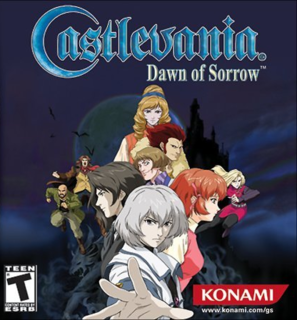One of the finest entries this side of Symphony of the Night....
While Castlevania first began as nothing more than a simple platformer (see 1987's Castlevania), it was 1997's Symphony of the Night that gave the series a facelift so great that the old games truly became archaic. SotN steered away from the antique linear pacing of other platformers, instead introducing players to open-ended gameplay (a la Super Metroid) mixed in with various elements that you'd find in an RPG. I could go on and on about the greatness that is SotN, but sadly, it's not the game that I'm reviewing.
Instead, focus your efforts on Dawn of Sorrow, the sequel of a game known for making its own radical renovations (both in gameplay and story).
The story picks up a year after the events of 2003's Aria of Sorrow. Unfortunately, I can't give away the backstory without giving away one of the series' greatest plot twists. But what I can tell you is this: The game takes place in 2036. Dracula (body and soul) was ultimately decimated in the apocalyptic battle of 1999. Soma Cruz was an ordinary boy studying in Japan until he was whisked away to Dracula's Castle. Soma fought for his life in order to survive, but learned of a horrible secret in the process... Now, a dark cult has risen from the shadows, and it's up to a reluctant Soma to "save the day" once more. Will he prevail, or succumb to the madness? That's your decision....
Gameplay, at its core, is a modified version of Aria's. Soma wields the "power of dominance." In other words, when he defeats an enemy, there's a chance that Soma will absorb their soul and use their as his own. With the exception of a few souls, these abilities can be upgraded when you obtain more than one version of that soul. Think of it as a much darker Pokemon. These souls can, in turn, be combined with weapons to form more powerful (and sometimes, overly cheap) weapons. The only trade-off? Some specific weapons require souls that are crucial to your journey.
Another new gameplay mechanic is the Magic Seal. During most boss battles, when the boss is at critical HP, a magical crest will appear on-screen. You then only have a small window of time to draw a specific seal. If you succeed, the boss is sealed away for good. If you fail, the boss regains some health and the fight continues. This is more of a gimmick than a (good) innovation as some fights can become tedious if you can't draw the seal correctly. And with the increasingly complex seal patterns that you'll have to memorize, expect to be frustrated a lot, especially towards the game's apex and conclusion.
Similar to SotN (and several later titles), Dawn uses an Metroid-esque open-ended castle. As Soma defeats bosses and gains the souls of enemies, you can travel and access more areas of the castle, obtain new items, and (of course) come closer to the game's epic (if not somewhat lacking) finale.
As another departure from the Castlevania norm, Soma (obviously) isn't a Belmont (or one of the Belmonts' branch families). Therefore, Soma can't use the Vampire Killer. Instead Soma can equip himself with various accessories, armor/clothing, and weapons (ranging from traditional weapons like swords and knives to more technologically advanced ones like firearms).
One of Dawn's strengths stems from its replayability. One of the best features in the game has to be the unlockable "Julius Mode". While the Sorrow series' supporting cast usually takes a backseat during Soma's adventures, playing as a vast majority of them is very satisfying.
The graphics remain the ever-crisp 2D that the games are known for (that's a positive by the way). My biggest complaint (artwork-wise) is that the magnificent stylings of Ayami Kojima is replaced by simpler anime drawings. The anime drawings aren't "bad" per se, but some of the personality and charm of Dawn's cast was definitely lost in the transition.
The music, while atypical of the series, does not fail to impress. Whether it's the remixes of favorite past tunes or new pieces, Dawn of Sorrow's audio does a fine job of conveying the overall mood of the game's plot and cast.
Dawn of Sorrow, unfortunately, still isn't the best title in the series. That claim probably goes to SotN, and that game alone will probably continue to be the scale on which all future Castlevania games will be weighed. Nevertheless, DoS is one of the series' best offerings. Dawn of Sorrow is far from perfect, but its stellar presentation will ultimately make you overlook that.

